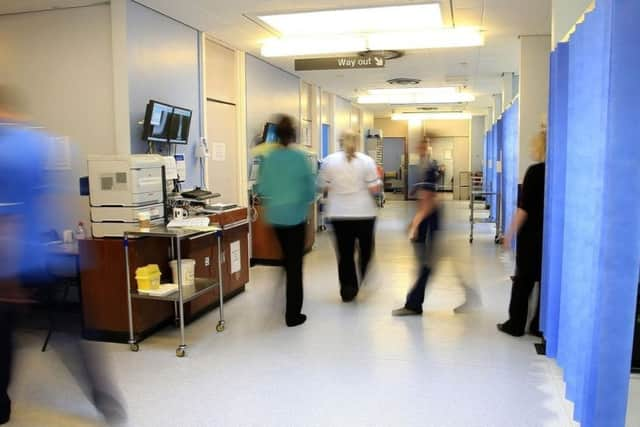NHS staffing shortage could become a 'national emergency'
There were 107,743 vacancies in England at the end of June, up from 98,475 in March and bucking a downward trend seen in 2017/18, according NHS Improvement.
A quarterly report by the health regulator said the rise in vacancy was expected to continue through the financial year.
Advertisement
Hide AdAdvertisement
Hide AdIt also reveals that NHS trusts sin England were more than 800m in deficit at the end of June as financial woes for cash-strapped hospitals continued.


Siva Anandaciva, Chief Analyst at health thinktank The King’s Fund, said: “Widespread and growing nursing shortages now risk becoming a national emergency and are symptomatic of a long-term failure in workforce planning, which has been exacerbated by the impact of Brexit and short-sighted immigration policies.”
The report shows that there are around 1.1m full-time staff are currently employed by the NHS, and that hospitals have overspent by millions of pounds on hiring temporary workers to plug staff shortages.
There were 41,722 nursing vacancies in England at the end of June, 80 per cent of which were filled by bank or agency staff, and 11,576 unfilled posts for doctors, 85 per cent of which were plugged with temporary workers.
Advertisement
Hide AdAdvertisement
Hide AdBetween April and June, NHS trusts spent £805m on bank staff, £102m more than planned, and an additional £599m on agency staff, which was £32m over-budget.
Trusts across England were £814m in deficit at the end of June, the report also reveals.
That was £22m better than planned at the beginning of the year, but £78m worse than the year ending June 2017. The projected £519m deficit for the end of 2018/19 is “clearly unaffordable”, the report said.
A&E staff saw 5,602,531 patients in less than four hours between April and June, compared to 5,427,860 in the same period last year, despite a rise in attendances. But 3,402 patients were waiting longer than 52 weeks for planned treatment in June, compared to 1,475 at the same time last year.
Advertisement
Hide AdAdvertisement
Hide AdChris Hopson, Chief Executive of NHS Providers, which represents NHS trusts, said: “Trusts tell us they are most worried about the workforce shortages they face, and it’s a real concern that these figures have shown such a big increase in vacancy levels.”
NHS Improvement Chief Executive Ian Dalton said: “A&Es up and down the country have been successful in treating more patients than ever before within four hours. We are helping trusts ensure that no-one stays in hospital longer than they need to, so that beds are free for other patients who urgently need them.”
Department of Health and Social Care spokesman said: “Despite 22,000 more emergency admissions a month than this time last year, hard-working staff have continued to provide world-class care.
“To support their efforts we’re training 25 per cent more doctors, nurses and midwives, giving a significant pay rise to over a million staff, and investing in the future of the NHS so that by 2023/24 it will receive £20.5bn a year more than it does now.”